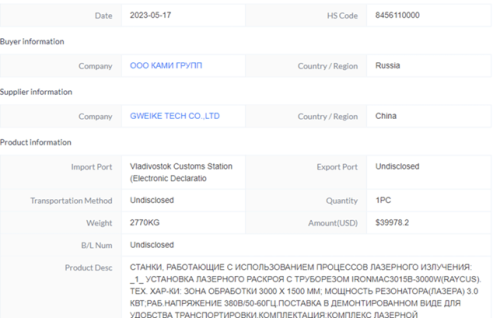In 2022, the toughest sanctions since 2014 were imposed on Russia, aimed at crippling its military-industrial complex by limiting access to high-tech products. These measures were designed to disrupt Russia’s ability to produce military equipment and armaments. However, despite these restrictions, the Russian defense sector has managed to continue its operations and even demonstrate growth in some areas. A significant factor behind this resilience is the ongoing supply of high-tech equipment from Chinese manufacturers, who have continued to support the Russian defense industry.
Throughout 2023, Chinese exports of metalworking machinery to Russia reached $390 million—a fourfold increase compared to $94 million in 2022. This increase underscores the deepening cooperation between Chinese companies and the Russian defense industry, despite the sanctions imposed by Western nations.
The Role of Chinese Companies in Russian Defense
Chinese companies have been instrumental in ensuring that Russia can continue to manufacture military equipment. Among the leading suppliers is G-WEIKE (GWEIKE TECH CO. LTD), which provided the Russian defense industry with LF1313 laser cutting machines featuring autofocus technology. These machines were delivered to the Scientific Research Institute of Measuring Instruments—Novosibirsk Plant named after Comintern, a facility involved in producing the S-300 and S-400 Triumph air defense systems and their radar stations. G-WEIKE executed 36 shipments to Russia.

Another major player is Z-MaT (ZHEJIANG ZHENHUAN CNC MACHINE TOOL CO. LTD), which supplied high-precision lathes equipped with the Super P30H feeding device and Siemens 808D CNC. These machines were delivered to the Scientific and Production Complex “Iskra,” which uses them to produce radio-electronic equipment, communication devices, and other specialized technology. Shipments were made through companies such as “AMG” and “ALTEZA.”
SINO MACHINERY CO. LTD also played a key role, supplying machining centers to Russia through “KAMY GROUP.” Two confirmed deliveries went to the M.I. Kalinin Machine Engineering Plant, where they were used in the production of missile systems, including the Buk M1 and Buk-M1-2.
Broader Chinese Support
Several other Chinese companies have supported Russia’s defense industry:
• JPW Tools AG supplied a wide range of metalworking machinery to ITA Technologies, including CNC lathes and vertical CNC milling machining centers. These tools were vital for maintaining production levels in Russia’s defense factories.
• KEDE Numerical Control Co. LTD provided machining centers and spare parts to the M.I. Kalinin Machine Engineering Plant, which were used in the production of Buk missile systems.
• SHENYANG HEAD SCIENCE & TECHNOLOGY CORPORATION LIMITED made 11 shipments of waterjet cutting machines to various Russian companies between May and August 2023. These machines are essential in industries such as aviation and metallurgy due to their ability to cut materials of varying hardness.
• NINGBO HAITIAN PRECISION MACHINERY CO. LTD supplied vertical milling machining centers to PJSC “Saturn,” which manufactures ground-based radio-electronic equipment.
• TIANJIN NO.1 MACHINE TOOL CO. LTD delivered CNC gear-shaping machines to the M.I. Kalinin Machine Engineering Plant for the production of opto-mechanical and opto-electronic devices used in armored vehicles and aviation.
A Deliberate Strategy?
The scale and frequency of these shipments suggest that Chinese authorities are aware of—and perhaps support—these activities. Given China’s tight control over its private sector, it is unlikely that these companies are acting independently. This pattern of sustained cooperation between Chinese firms and Russian defense enterprises indicates that there is unofficial approval from Beijing for this exchange of dual-use goods, which are critical for maintaining Russia’s military production capabilities.
In conclusion, Chinese companies have become crucial partners in supplying the Russian military-industrial complex with the machinery necessary for its continued operation. Despite Western sanctions, the Russian defense sector has been able to maintain and even enhance its production capacities, thanks in part to Chinese machinery manufacturers. As long as these shipments continue, it seems that attempts to isolate Russia’s defense industry will face significant challenges.






